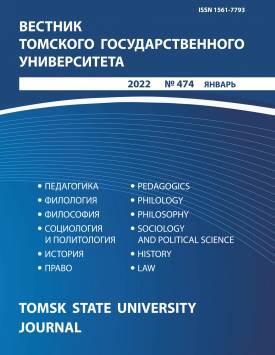Pronominal representation of the experiencer when expressing indifferent and non-indifferent attitudes in Russian-language discourse
The author of the article aims to test the assumption that the representation of the subject of an indifferent attitude in the phraseological units of the Russian language by the first-person pronoun is not accidental. The regularities of the experiencer's representation in messages about indifferent and non-indifferent attitudes are found in contexts with a stylistically neutral verb volnovat' [agitate, bother, cause concern, etc.]. The source of the material is the resources of the Russian National Corpus and Google Books Ngram Viewer. The corpus tools for extracting and processing information, methods of quantitative analysis, and generalization of the obtained data were used. In messages about indifferent and non-indifferent attitudes, constructed using the verb volnovat', the predominantly pronominal representation of the experiencer is found. The representations of the experiencer by the first-person pronoun menya [me] quantitatively prevail over other pronominal representations. Participants of the Russian-language discourse are more inclined to inform about the state of concern, a non-indifferent attitude to something, than about an indifferent attitude towards what constitutes a private or social being of a person. Messages with the representation of the experiencer by pronouns of the first and third persons, which statistically outperform messages with the representation of the experi-encer by pronouns of the second person, differ in the spheres and, accordingly, in the genres of their predominant use. Journalistic writing is more focused on communication in the “here and now” format, an open dialogue about what excites or should excite each and many; therefore, the experiencer in messages about a non-indifferent attitude is more often represented by pronouns menya [me], nas [us], ikh [them], in messages about an indifferent attitude -pronouns nikogo [nobody], menya [me], ikh [them]. In literary discourse, the narrator focuses on the inner world of the character, hence the most frequent representations of the experiencer are ego [his], eyo [her]. The pronominal representations of the experiencer are fixed in combinations with the verb volnovat' mainly in messages about indifferent and non-indifferent attitudes, localized in the present tense. The exception is representations of the experiencer by pronouns ego and eyo with the verb volnovat' in literary texts: combinations of these pronouns with the verb volnovat' in the past tense outperform by frequency the combinations with the verb forms in the present tense. The pronominal representations of the experiencer in combinations with the verb volnovat' are predominantly contact and prepositive, that indicates on the action of speech stereotypes, leading ultimately to the formation of speech patterns -the preservation of form and content in the form of combinations that blur the borderline between free word combinations and reproducible units.
Keywords
pronoun, verb, combination, experiencer, indifferent attitude, non-indifferent attitudeAuthors
| Name | Organization | |
| Nichiporchik Elena V. | Francisk Skorina Gomel State University | evnich@gmail.com |
References

Pronominal representation of the experiencer when expressing indifferent and non-indifferent attitudes in Russian-language discourse | Vestnik Tomskogo gosudarstvennogo universiteta – Tomsk State University Journal. 2022. № 474. DOI: 10.17223/15617793/474/11
